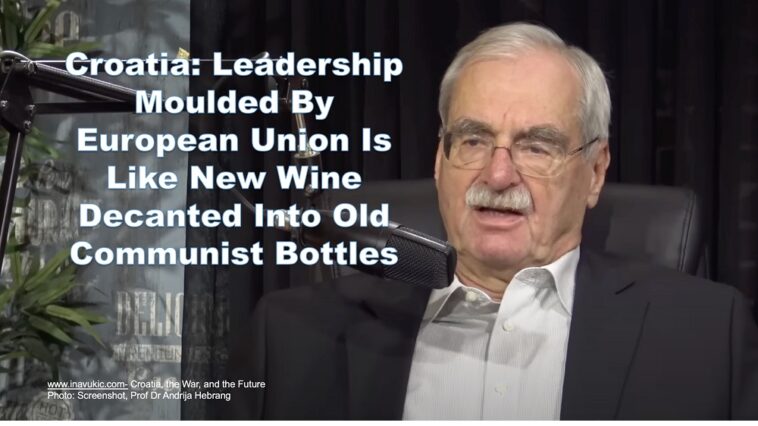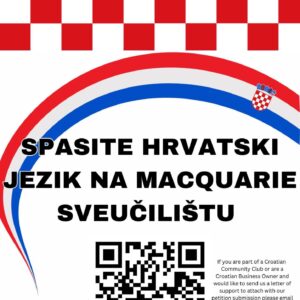When history is written, two blunders of Croatia under all Prime Ministers and Presidents particularly since year 2000 to today, that is, almost immediately after Dr. Franjo Tudjman’s death, will stand out for irreparably damaging its long-term interests in developing a fully-functional democracy and validating as most precious for freedom and democracy the thousands of Croatian lives lost in the Homeland War as well as validating as the nation’s united aspirations the 93.24% referendum vote for secession from communist Yugoslavia after which the Serb and Montenegrin aggression against Croatia turned vicious and barbaric. These two irreparably damaging blunders are:
– the underhanded and ruthless helping to bring the former communists to the centre-stage of Croatian politics, and
– compliance with the European Union’s push to include in the government coalition the section of Croatia’s Serb ethnic minority that was involved in the aggression against Croatia, rebel-Serbs or those close to them, and not the section of the Serb minority that fought shoulder to shoulder with Croats to defend Croatia from Serb aggression.
Both of these moves ensured that the central pillar of stability and national unity, Homeland War values, were and are pushed to the brink of insignificance and, hence, the development of a healthy democracy severely disadvantaged. While the European Union might have, erroneously and offensively (to victims of Serb Aggression), thought that such government coalition in Croatia will produce conducive conditions for reconciliation all it did was equate the victim with the aggressor. All it did is push into insignificance the fact that 93.24% of Croat voters voted in 1991 to exit communist Yugoslavia and enter the democratic world similar to that of the so-called Western world.
These two moves also ensured that corruption and nepotism, which were perfected during communist Yugoslavia, in the public administration and government sector thrived on and to this day remain an inveterate canker afflicting the path to a fully functional democracy in Croatia.
Generally, and worldwide, though, one could be forgiven for believing that the age of fully functional democracy has ended. Two massive nations, Russia, and China, have for at least two decades been strongly trending toward one-man rule. The list of countries that have been drifting into autocratic orbits seems to be growing all the time with power being centralised, media controlled, the courts manipulated, and protest squelched.
Once again, it seems, democracy has a competitor. Strongmen are rising in part because elected governments are struggling to address new challenges: global migration, technological advances, transnational terrorism, international economic unrest. More and more people are willing to try, or tolerate, another approach.
Croatia’s renowned War Minister of Health and former Deputy Prime Minister (December 2003 to February 2005) Prof. Dr. Andrija Hebrang was recently interviewed on 10 November 2023 by journalist Marko Juric for “Project Velebit Podcast” who had the following to say on the matter:
“I was in the government when Brussels ordered a coalition with the Serbs.
For me, the most tragic lie in recent Croatian history is the suppression of Serbian and Montenegrin crimes in the aggression against Croatia. In other nations, the perpetrators of crimes sweep the truth under the carpet, and in Croatia the victims. We ourselves sweep that truth under the carpet. We are the only war that has recorded every civilian victim. Because we have introduced a network of 32 places in Croatia in the health headquarters, where we have appointed experts for identification and all the victims have been identified, compared with the mobilisation lists, so that the list would not show someone in civilian clothes who actually was a soldier, to get a 100% definition of a civilian victim, and on that list we have 7,263 civilian victims. Forbidden data. … the former as well as Ivo Sanader’s entire government (in which I served as Deputy Prime Minister) begged me not to publish this information. Brussels said that since we were entering the European Union as member state, it was not convenient to raise tensions against the Serbs. Because if you announce how many Croats they killed, then you will have instability, and they asked us to form a coalition with the Serbs. The first such coalition emerged during Ivo Sanader’s government, to which I was a witness, as Deputy Prime Minister, a man called Mr. Svoboda came to Croatia in 2004 and said you must go into a coalition with the SDSS (Independent Democratic Serbian Party in Croatia). So, it follows that they won’t allow the truth about Serbian crimes, and they were forcing us into that coalition. There is no logic whatsoever that the former aggressor participates in the government, so Croatia is the only country in the European Union where the aggressor participates in key decision-making. It is known what minorities should do, they should maintain their cultural, historical, and folk customs, but the minority cannot decide on the state budget or key strategic decisions of the government. This is happening only in Croatia. Well, no one else has a ruling minority in the coalition. The Serbs belong to one big bloc headed by Russia, it is one mechanism that controls the world’s atomic weapons, controls the energy, and it controls numerous mineral resources. So, it is about one big entity, and that entity has its own requirements and whom to satisfy so that it can extract certain profits from them. And this is the mechanism why the Serbs were in all international bodies during the Homeland War, and the Croats were nowhere…
Today, the Prime Minister Andrej Plenkovic decides whether he will enter into coalition with the Serbs or not. Franjo Tudjman faced much bigger pressures than what the governments after his death did and yet, he rejected them all in an instant.
…When was the fate of Croatia’s future decided?
In the so-called first free elections of 1990, those elections were the result of the awakening of the people and they had to defeat the communists and we defeated them in the elections. However, the communists, experienced by so many decades compared to the rest of us who entered the political forefront for the first time in our lives, quickly found their way and reacted. The elections in many post-communist countries solved the ideology, you have post-communist countries where glorification of communism is prohibited, where the five-pointed star is prohibited, because the communists lost the elections in 1990 in those countries. You have countries where their leaders were liquidated, remember Romania, where they also liquidated their fifth columnists, even those who ruled those countries in the official secret services. This did not happen in Croatia. Why? Because we, the real Croats, non-communists, lost the first democratic elections. Now you will ask how the elections were lost when we won them. We only won for one night. So, after the first round of the first democratic elections, when they saw that the communists were weak, the communist brats headed by Ivica Racan quickly handed over the weapons of the territorial defense intended for the arming of 200,000 Croats to the KOS (Counterintelligence Services of communist Yugoslavia) in Belgrade. Formally, Racan did not oppose it, so it passed. In Slovenia, they stopped the handing over of one third of those weapons and were stronger and met the aggressor armed. We met the aggressor unarmed thanks to the communist Ivica Racan (who by the way became the Prime Minister of Croatia almost immediately after Franjo Tudjman’s death).
Then comes the second round of elections and we win definitively again, but only for one night. Over that night, 98,000 members of the defeated communist party joined the ranks of the victorious HDZ (Croatian Democratic Union party). 98,000 members of the Communist League switched to HDZ. And we, anti-communists from HDZ were already in the minority the next morning. And with that, the future of Croatia was determined…
Every nation decides its own destiny. When the people mature, when they look at Croatian history, when they look at the falsifications of Croatian history and when the people mature and see, then another big step forward, another awakening, will happen… That is to say, nations mature very slowly in order to create their own state and even slower to develop it…”
On both sides of Croatian political spectrum, the so called right and the so-called left, populist leaders and movements have emerged to challenge the political elites ruling over Croatia since year 2000, but more from right, whose commitment is to patriotism and Croatian sovereignty, than the left, whose commitment to open borders holds little appeal for the victims of global economic restructuring. To illustrate the political activism in Croatia, which has undoubtedly arisen from dissatisfaction and disappointment about the way Croatia is being ruled, it is significant to know that in 2021 there were 172 political parties registered in Croatia, which has less than 4 million people. In 2023 that number is either slightly lower, or higher – as the mega election year of 2024 draws nearer those numbers will be known. Despite the overwhelming number of political parties in Croatia there seems to be little sign of mass intellectual renewal vis-à-vis Croatian historical truth of independence plight, political realignment in accordance with it, and institutional reform that history suggests are the pre-requisites for resolving a national crisis of identity and, with it, the future that was marked and planned for during the Homeland War. The coming general and presidential elections in Croatia, due in 2024, will serve as an indicator as to just how much of the intellectual renewal there has been in Croatia that spills into the ballot boxes and sees at least enough change in the voter preferences to cause the former communists or their children holding power, to feel threatened and their position weakened. Ina Vukic





Komentari